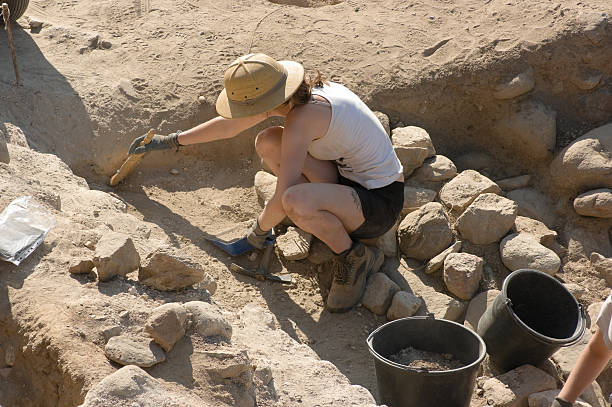
| Archeologist Key Stats | |
|---|---|
| Education | 4+ Years |
| Job Outlook | 3.9% |
An archeologist studies human societies past by investigating artifacts, architecture, and biological specimens left behind.
If you enjoy history and research, have a curious nature, and are good at academics then you might like to become an archeologist.
Archeology is a two-sided discipline, and is considered both a science and a humanity field.
One part of this field is dedicated to analyzing the culture and customs of past civilizations, while the other focuses on the physical nature of such societies including tools, buildings, and fossil evidence.
Despite what many people think, archeology doesn’t involve action packed adventures like you might have seen in movies like Indiana Jones.
In fact, most archeologists only spend a small amount of their times on an archeological site.
Most work in colleges, and spend their time teaching students or publishing papers.
Table of Contents
Education Requirements to Become an Archeologist
To become an archeologist, you should prepare yourself for a lot of education.
If you’re still in high school, prepare yourself by taking subjects in the humanities and sciences.
You might also like to join some extra-curricular clubs that reflect your interest in archeology.
At college, you’ll need to complete a four year college degree with a major in archeology or anthropology.
Try and take subjects that will complement you interest in archeology, for instance history, geography, and sociology.
You will need to attend graduate school to become an archeologist, and attain a master’s and doctorate.
Look for a school with a good archeology program.
The better the school’s reputation, the more funding it will get, and the greater opportunity you will have to attend digs and gain experience.
Whenever you can, take the opportunity to conduct research and publish papers.
Most archeologists are employed by a college.
During the year they will teach and write papers on their findings.
Over the summer they will attend digs.
It’s likely that your employer will be a college, and you will need a doctorate degree to teach.
Archeologist Job Description
While most archeologists work for universities, some are employed by museums or non-profit organizations.
Most of the time, you can expect to be working in a teaching environment while attending a dig once or twice a year.
An archeologist working in a college setting would divide their time between their own research, teaching students, marking paper, and publishing their findings.
On a site, an archeologist will survey, prepare, excavate, and analyze a site.
Here are some of the tasks of an archeologist:
- Teaching
- Marking papers
- Publishing findings
- Overseeing research projects
- Applying for grants
- Attending digs
- Surveying dig sites
- Excavation at dig sites
- Analyzing finds
- Reading journals and papers
Archeologist Salary and Career Path
An archeologist will complete many years of studying before they get the opportunity to attend a dig.
Many work as teaching assistants or research assistant while they are completing postgraduate qualifications.
Another option is to become a Principal Investigator.
These archeologists manage sites and digs.
While there is much more action involved in these roles, most are employed on a contract basis which means you don’t have a secure income.
While you may have been told that there are not many opportunities in archeology, this is in fact a myth.
There are hundreds of digs taking shape across the world right now, and are all good job prospects.
In fact, the Bureau of Labor places archeology as a field of work with high growth in the coming years.
The salary for an archeologist varies somewhat, the median salary is around $54,000 a year according to BLS.gov, while the most experienced people in the field can earn upwards of $90,000.
A college professor with teaching commitments could expect to at the top of this range, while a research assistant at a site would earn less than the median.
Some similar career paths include:
There is a lot of education and hard work involved on the path to become an archeologist.
However, if this is the career you are passionate about, then you will enjoy the steps involved on this journey.
Those that put in the effort will be rewarded with a very fulfilling career.
![]() The below information is based on the 2023 BLS national averages.
The below information is based on the 2023 BLS national averages.
National Average Salary
$69,780Average Salary by State
| State | Avg. Annual Salary |
|---|---|
| Alabama | $61,500 |
| Alaska | $84,320 |
| Arizona | $69,880 |
| Arkansas | $64,090 |
| California | $76,930 |
| Colorado | $68,070 |
| Connecticut | $51,330 |
| Florida | $58,370 |
| Georgia | $59,680 |
| Hawaii | $85,720 |
| Idaho | $73,900 |
| Illinois | $62,000 |
| Indiana | $63,770 |
| Iowa | $57,840 |
| Kentucky | $62,970 |
| Louisiana | $76,570 |
| Maryland | $69,810 |
| Michigan | $91,890 |
| Minnesota | $74,600 |
| Missouri | $71,640 |
| Montana | $72,810 |
| Nebraska | $90,210 |
| Nevada | $76,000 |
| New Hampshire | $60,550 |
| New Jersey | $75,570 |
| New Mexico | $61,120 |
| New York | $57,780 |
| North Carolina | $70,990 |
| Ohio | $69,600 |
| Oklahoma | $67,770 |
| Oregon | $73,390 |
| Pennsylvania | $60,120 |
| Rhode Island | $71,410 |
| South Carolina | $65,520 |
| South Dakota | $64,440 |
| Tennessee | $56,700 |
| Texas | $63,760 |
| Utah | $74,580 |
| Virginia | $70,790 |
| Washington | $74,320 |
| West Virginia | $64,860 |
| Wisconsin | $62,280 |
| Wyoming | $68,140 |
The top earning state in the field is Michigan, where the average salary is $91,890.
These are the top 5 highest-paying states in the field:
* Employment conditions in your area may vary.
Frequently Asked Questions
What does an archeologist do?
An archeologist is someone who studies the origin, behavior, and development of humans and their societies.
The typical duties of an archeologist usually include developing data collection methods that are tailored to a specific project, culture, or specialty; planning research projects to test hypothesis and answer questions about human activity; recording and managing records; collecting information from interviews, documents, and observations; writing reports and giving presentations; analyzing data and laboratory samples; advising organizations on the cultural impact of proposed policies, programs, and plans, and so on.
An archeologist can work for a museum, university, research organizations, private corporations, consulting firms, or the government.
There are a few areas in archeology – prehistoric, historical, and biblical archeology, paleopathology, ethno-archeology, forensic archeology, etc.
How much do archeologists make?
On average, an archeologist can make a little more than $62.000 per year in the United States.
In case you decide to follow this career path, you can expect to earn anywhere between $37.000 and $97.000 annually.
The salary would certainly depend on a variety of factors – your education and experience level, the employer, the location and so on.
Archeologists that work in Massachusetts and Hawaii, for example, have the highest average salaries.
An entry-level anthropologist can expect to earn $18 per hour, while specialists with years of experience can make $47 per hour.
How much does it cost to become an archeologist?
You would certainly need a bachelor’s degree in archeology, in order to qualify for entry-level positions.
A year in a university can cost you anywhere between $8.000 and $45.000 (and more); the cost depends on a variety of factors (the books, supplies, and accommodation expenses are not included).
To improve job perspectives, you should go for a master’s degree archeology, anthropology, or a related discipline ($6.000-$22.000 per year).
Those who want to become university professors and conduct independent research should have a doctorate degree ($36.000-$49.000).
What is the demand for archeologists?
Between 2016 and 2026, the archeologist job market is expected to grow by 3.9%, according to the Bureau of Labor Statistics.
That is slower than the national average for all occupations in the United States.
The number of positions in the industry is limited by state and federal government.
The candidates that possess a graduate degree, have experience, and know foreign languages will have the best job perspectives.
The industry is mainly concentrated in California, New Mexico, and Arizona.
How long does it take to become an archeologist?
It will take you 4 years to obtain a bachelor’s degree.
A bachelor’s degree should be enough to qualify for entry-level research positions.
A master’s degree will typically take you 2 years to obtain, while a doctorate degree will require 3-7 years.
The majority of employers expect you to have years of field and internship experience.
The sooner you decide what sub-discipline you want to specialize in, the better.










